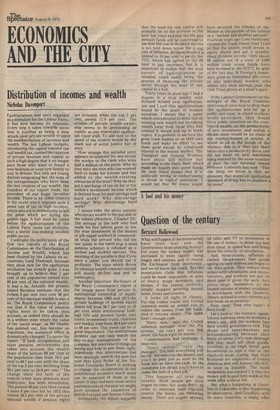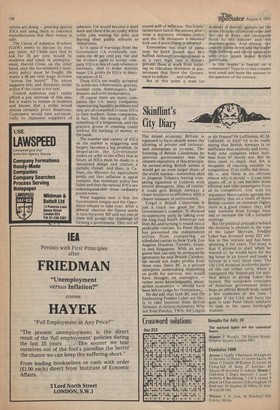A fool and his money
Question of the century
Bernard llollowood
What will happen if the monetarists have their way and the Government stops printing money? For years the money supply has increased to meet rapidly rising wages and salaries and to rescue the Exchequer from insolvency, and we all know the result. But the monetarists claim that inflation could be made impossible, in spite of heavy wage demands and strikes, if the central authority simply stopped printing pound notes, fivers and tenners. It looks all right in theory. Pay-day comes round and United Asbestos sends an armed van to collect the money from the bank. And it returns empty. The bank hasn't enough cash.
-Sorry, men," says the United Asbestos manager over the PA system, -we can't pay you this week: the bank's got no money."
Consternation. Bad language. A near-riot.
"Don't worry," says the manager, -I'm sure everything will be OK. We owe you the money and you'll be paid just as soon as the bank lets us have the cash. In the meantime I'm afraid you'll have to make the best of a bad job."
This happens all over the country. Most people get their wages on time, but some don't. In order to maintain their required reserve the banks are rationing money. There are urgent appeals on radio and TV to economise in the use of money, to draw out less than usual, to spend less and bring down the velocity of circulation.
And, miraculously, inflation is curbed. Shopkeepers find goods ageing on their shelves and begin to cut their prices. They reduce their orders with wholesalers and manufacturers, and workers are put on short time or given the sack. And prices adapt themselves to the limited amount of money available, in accordance with the Quantity Theory defined in every elementary text book on economics.
Easy, easy! Then why hasn't it been tried?
Let's look at the scenario again. United Asbestos owes its workers a week's pay, and the workers buy their weekly groceries on tick. The shops and supermarkets are accommodating because they know all about UA's cash shortage and they must sell their goods. Goodfare in the High Street gets housewives to sign .a chit at the checkout point stating that their husbands are employees of United Asbestos and will honour the IOU as soon as possible. The bank meanwhile has assured 1,JA that the money will be paid next week or the week after without fail.
But what's happening at Goodfare in Coketown is also happening in other towns. And Goodfare, with its many branches, is doing what others are doing — printing special IOUs and using them to convince manufacturers that their money is safe.
The Union of Asbestos Workers (UAW) meets to discuss its next pay claim. All Clubb says that to ask for 35 per cent would be madness and result in unemployment. Harold Clone, on the other hand, says the Government's monetary policy must be fought. He wants a 40 per cent wage increase "across the board." The union supports him and threatens strike action if the claim is not met.
United Asbestos can't really afford a pay increase of this size, but it wants to remain in business and knows that a strike would almost certainly prove disastrous. Customers would turn automatically to Japanese suppliers of asbestos. LIA would become a dead duck and there'd be no cushy white collar jobs waiting for sons just leaving their public schools or universities.
So in spite of warnings from the Government UA eventually concedes the 40 per cent pay rise and the workers agree to accept company IOUs in lieu of cash whenever necessary. And to make ,matters easier UA prints its IOUs in denominations of El.
These IOUs are readily accepted by publicans, tobacconists, grocers, football clubs, fishmongers, hairdressers and even bookmakers.
Of course there are many companies like UA, many companies experiencing liquidity problems and they are all compelled to issue IOUs to their workers. Some companies, in fact, find the issuing of IOUs something of a temptation, and the practice grows of creating credit without the backing of money at the bank.
The number and variety of IOUs on the market is staggering and forgery becomes a big problem. In desperation the Government makes an order to the effect that in future all IOUs must be made to a specialised design and contain a metallic thread. And then, in Cabinet, the Minister for Agriculture points out that inflation is again rampant, that monetary policy has failed and that the newest IOUs are indistinguishable from ordinary pound notes.
What happens next is that the Government resigns and the Opposition refuses to take over, After a general election the Queen sends, in turn for every MP and not one of them will accept the challenge of forming a government. They are all scared stiff of inflation. The monetarists have failed, the unions won't wear a statutory incomes policy and the CBI threatens a national lock-out if price-fixing is adopted.
Economists run short of panaceas. Sir Keith Joseph says he's baffled. Although unemployment is at a very high rate it doesn't prevent those at work from insisting on ridiculous increases in pay, increases that force the Government to inflate. . . and inflate.
But at this point a man (or woman) of destiny appears on the scene. He talks of law and order and the use of force and thousands flock to his banner and his machine-guns. And slowly the country calms down and the leader finds ruthless and clever assistants who once again make Britain governable.
Is the leadera fascist or a communist? Tune in to this column next week and learn the answer to the question of the century.



































 Previous page
Previous page